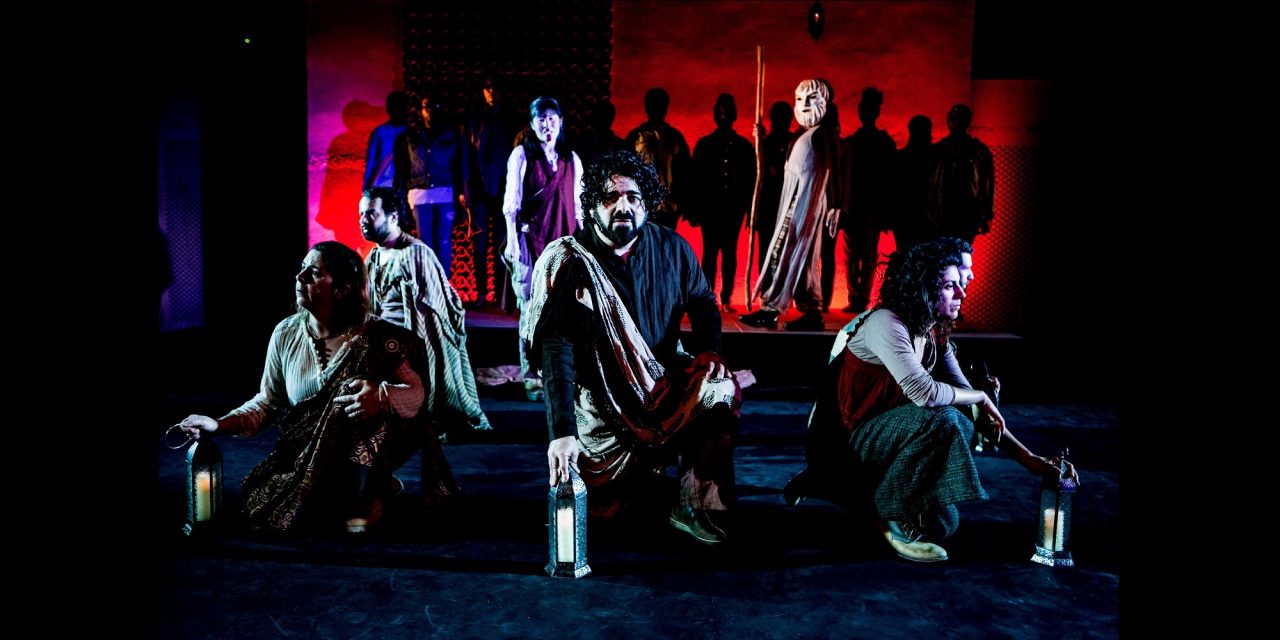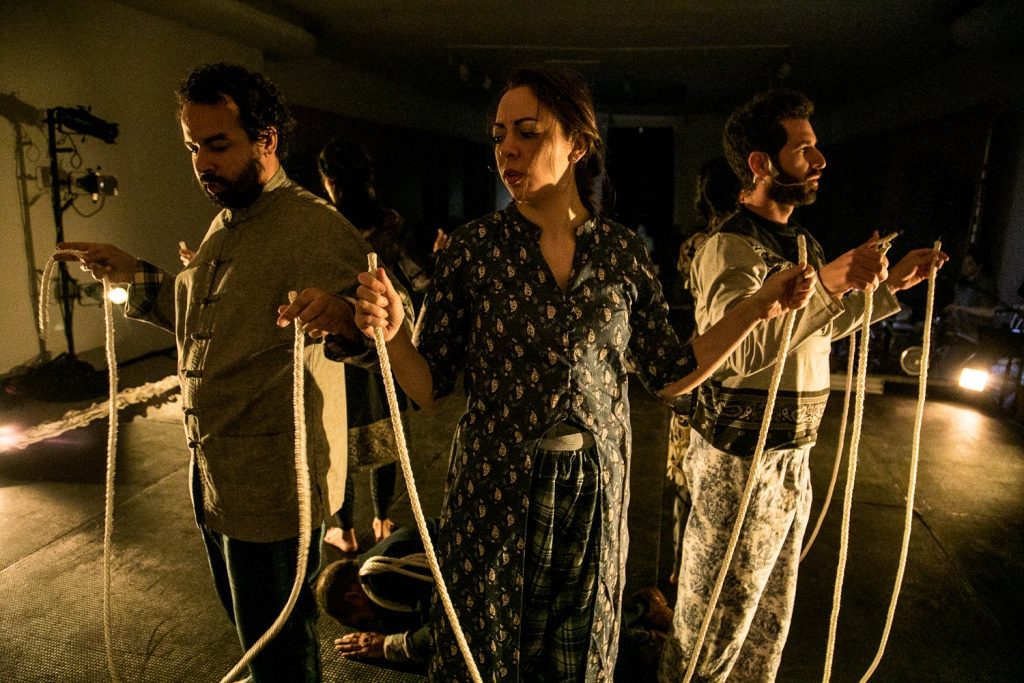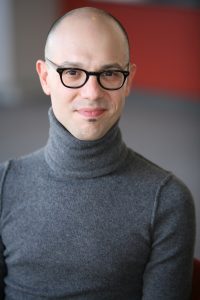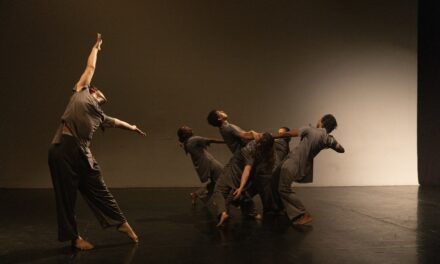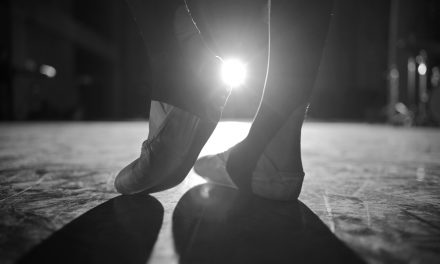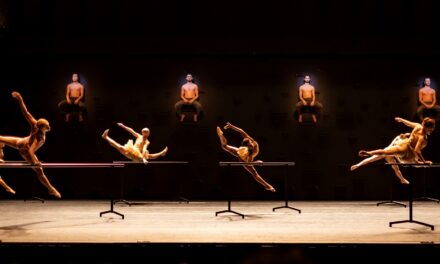On August 14, 2020, theatre dybbuk is scheduled to premiere Aaron Henne’s new play breaking protocols at the Philosophical Research Society in Los Feliz. It will run for four consecutive weekends with performances on Fridays, Saturdays and Sundays through September 6. Also scheduled were two In-Progress Events, the first at LACE on April 25th and the second at The HIVE on May 27th. As with everything, the COVID-19 outbreak has forced them to alter their plans.
On April 25, 2020 in partnership with LACE the In-Process Event will go on as scheduled but as a two hour Virtual In-Progress Event starting at 8 PM. It will include readings from the in-progress script as well as a workshop that explores the themes of the show. Information on how to register for this free event is at the end of this article. The event scheduled at The HIVE is pending.
Acting upon a request by dancer and choreographer Kai Hazelwood, I attended my first performance of theatre dybbuk in August of 2016 at The Fowler Museum’s amphitheater. The play exagoge was written and directed by Aaron Henne and inspired by an original Greek translation by Will Dilbeck . As a dance critic, I was hesitant to review theater but the company made any uncertainties that I might have had vanish when I discovered that Henne’s work was filled with beautiful movement. It was not what one thinks of as dance per se, but the actors brought their characters and the story to life via movement and text.
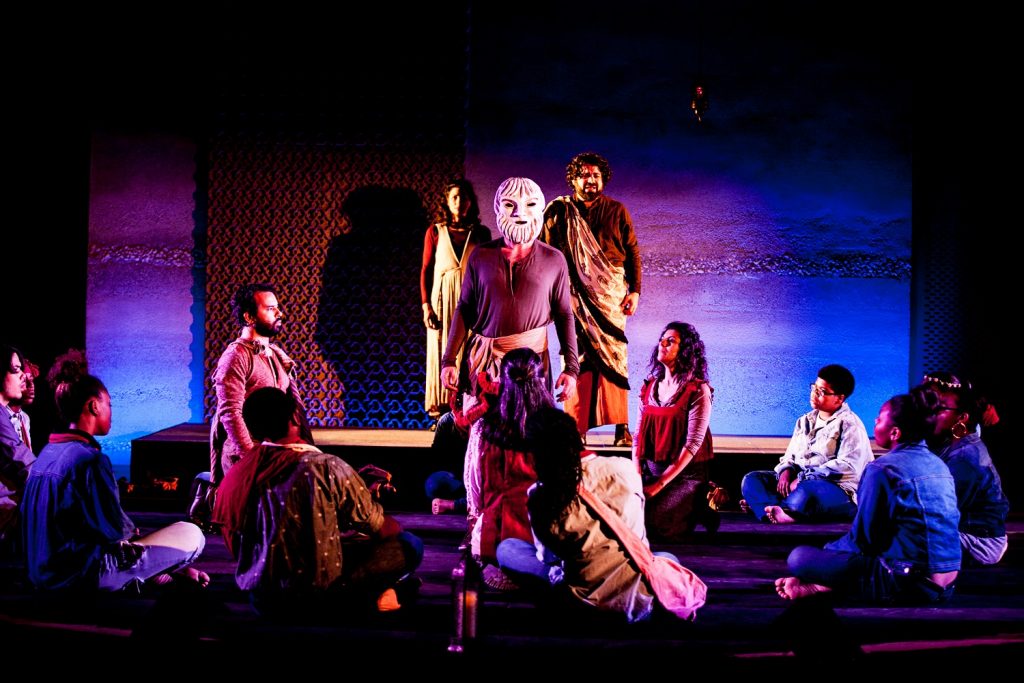
theatre dybbuk in “exagoge” – (back to front) Julie A. Lockhart, Rob Adler, Nick Greene (masked), Jonathan C.K. Williams, Diana Tanaka (facing upstage), Jenny Gillett, with members of The Harmony Project Leimert Park Choir – Photo by Taso Papadakis
I then reviewed theatre dybbuk’s lost tribes (2018) and hell prepared (2019) for LA Dance Chronicle, so when I received the press release about this new play, I contacted the company about a possible telephone interview with company’s Artistic Director, Aaron Henne. I wanted to learn more about his new play breaking protocols, but also how the company was handling these tumultuous times. Fortunately, he agreed.
“The play breaking protocols uses the notorious, fraudulent [and] antisemitic text The Protocols of the Elders of Zion as a jumping off point to investigate a larger questions around, yes of course antisemitism and anti-Judaism, but also around all false narratives” Henne said, going on to explain how the performance will investigate some of the reasons why people might believe false narratives, why they seem to need to fabricate stories against already marginalized people such as Jews or, for that matter, any one group of people.
The Protocols of the Meeting of the Learned Elders of Zion was first published in 1903 and purportedly described a Jewish plot to dominate the world. This hoax, which claimed to be the minutes of a meeting or a series of meetings of Jewish leaders, went on to be translated into numerous languages and circulated around the globe to falsely state that their goal was to “subvert the morals of Gentiles” and “to control the press and the world’s economy”.
Because theatre dybbuk bases its work around Jewish history, Henne was looking for an entryway into how to have a discussion around these false narratives and then have them relate to the extremely conservative policies involving immigration that are currently being enacted not just in America but around the world.
“To me the most extreme entry point to ways in which false narratives are use to justify prejudicial beliefs is, of course, this fake text.” Henne said referring to The Protocols of the Elders of Zion. “It is so extreme and so absurd and yet so many people over the last hundred years or so have claimed that it’s true, in spite of it being proven false again and again. It struck me as the perfect vehicle to have this conversation.”
He and I discussed how two years ago there was all the hype and false accusations surrounding the so-called caravan of immigrants coming across our southern border from Central America through Mexico. It was not enough for people to simply state that these people were not welcome, they had to create horrible false narratives about them possibly being terrorists or if we let them in, they will destroy our way of life. “That’s an example,” Henne said. “of people who are seeking a place to be, being assigned power and nefarious motivations that do not match this reality.”
I asked Henne if he knew who authored The Protocols back in the late 1800s early 1900s. He said that it was actually up for debate. For a while it was believed the author was a man named Goloveiski (Spelling) who was principally acting as an operative for the Russian secret service to influence the Tsar, Nicolas II Alexandrovich Romanov (18 May 1868 – 17 July 1918) , politically. “In recent years, however,” Henne said. “ there are those who say that this narrative is probably not true and that the Protocols were probably written by a man named Pablo Krushevan who was an antisemitic publisher of a paper in Russia at the time.” There is some proof that Pavel Krushevan was the first to publish the Protocols and that they appeared to be in his style of writing. According to the Encyclopedia Britannica, Philip Graves, a reporter for The Times (London) revealed that the Protocols were a forgery that was “compiled by officials of the Russian secret police out of the satire of Joly, a fantastic novel by Hermann Goedsche (1868), and other sources.”
“It is up for debate.” Henne reiterated.
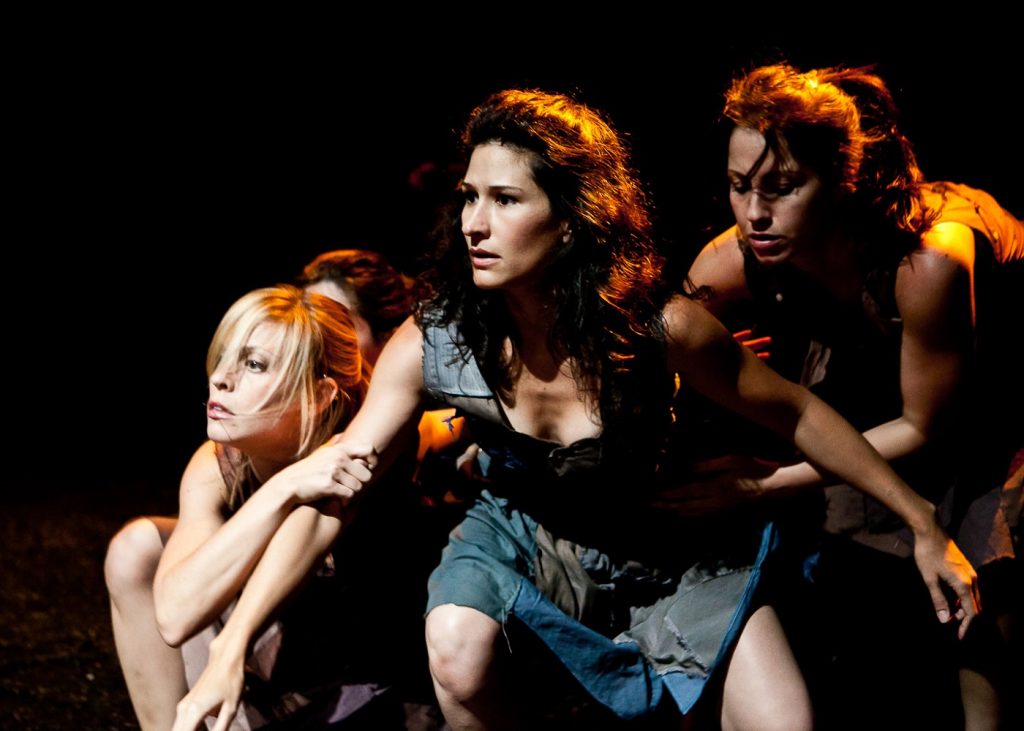
theatre dybbuk – “cave” – (L > R) Tiffany Sweat, Julie A. Lockhart, Melissa Schade – Photo by Taso Papadakis
Speaking directly to where, when and by whom The Protocols were written did not directly match the topic Henne was aiming to address in his new play. He next considered using the Bern Trials in Switzerland that put The Protocols on trial by suing the people who were distributing them under the country’s obscenity laws. The court found, of course, that the writings were fake but this was later overturned on appeal due to the court determining that it did not exactly, as a political publication, meet the legal standard of obscene. The court still agreed, however, that the papers were fake. . “Trials are a great entry point to reveal a lot of things.” Henne said, but he wanted to concentrate on what was going on in the US. Switzerland was simply not the right fit.
“It felt like putting a square peg into a round hole,” He said. “Where we eventually ended up was Vaudeville.” Vaudeville was often performed by immigrants as a satirical play or farce with music. In America, however, the art form evolved into a variety show consisting of 10 or more unrelated acts that featured comedians, trained animals, jugglers, musicians, singers and dancers. vaudevillian performers were people who were not necessarily among the more prominent culture and who often made fun of their own kind.
“I thought, oh! vaudeville is such a great entry point into this conversation.” Henne said. “Also, because with vaudeville you have this great variety of acts……I thought, what an effective vehicle for exploring various points in history, while the form itself can be used as a metaphor for America’s diverse ways of engaging and participating in society.”
Henne, along with his team at theatre dybbuk, decided to make the play about a struggling 1940’s touring Vaudeville troupe that was no longer viable, but who was still trying to use that genre to get their point across. “With the idea of the world leaving you behind, how do you deal with that?” Henne said. “1940 was a major election year. So, I thought these performers are engaging with their audience on the verge of an election. In 1940 Roosevelt was elected to his third term; that was challenging and questionable at the time because it was breaking precedent. And, there were big questions of isolationism versus globalism on the table.” America had not yet joined in the fight of WWII even though it was well known what was happening in Germany and throughout Europe. There was debate about whether or not America should enter the war, and if one was Jewish, the concern about one’s family in Europe was intensified.
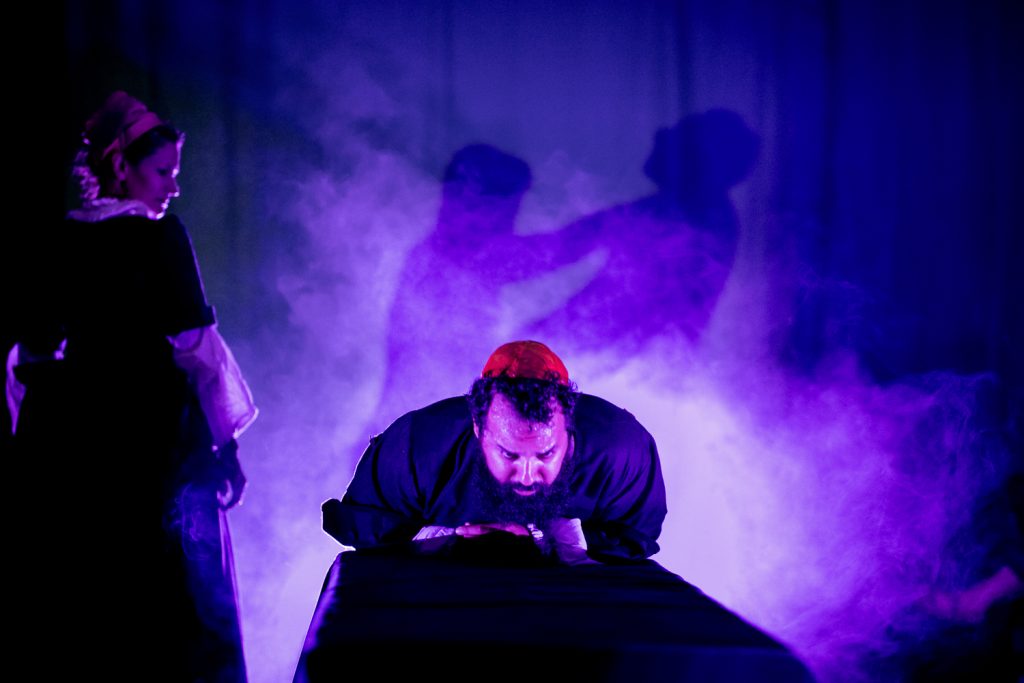
theatre dybbuk – “hell prepared” – Julie A. Lockhart (Sarah) and Jonathan C. K. Williams (Moshe) – Photo by Taso Papadakis
“It struck me that it would be meaningful to have an immigrant troupe trying to make the case for why we should care, especially when the well-being of their families is on the line. They would do so, at least in part, by using all the theatrical tools at their disposal to expose the audience’s hidden, and not so hidden, prejudices.” Henne said, sounding very excited about the idea.
One of the people dealt with in the current iteration of breaking protocols is the very famous industrialist Henry Ford. Here was a man who was an inventor, a pacifist and obviously intelligent, but who was notoriously antisemitic. Ford purchased a Michigan newspaper called The Dearborn Independent and used it together with a series of pamphlets called The International Jew to become a major distributor of The Protocols in America.
It is this contradiction of ideas that Henne’s breaking protocols is trying to investigate; why direct hate towards Jews or any group who have migrated and found themselves existing within the cultures of other countries. Sadly, around the world Jews have been an easy conduit for ‘otherizing’, for regarding a person or specific group of people as alien or different and therefore blaming them for one’s own country’s economic and/or social problems. Creating false narratives that place the blame on “the other”. Henne acknowledges that these prejudices originated thousands of years ago and are now deeply embedded within us in ways that we might not realize, understand or be willing to address.
Henne is using this idea as a metaphor for how this present administration is using otherizing as a weapon to “divide and conquer”. “That’s where the piece (breaking protocols) is using that as a metaphor for today, and not just Jews.” He said. “It’s happening to immigrants, refugees – people who do not necessarily have a dominant voice in our country and who can therefore become a convenient container for blame. By using disenfranchised and marginalized people in this manner, those who are in power distract and deflect, in an effort to avoid people saying to them, ‘It’s your fault’, which could then result in political action not to their benefit.”
It is very clear that everyone associated with theatre dybbuk works as a team, as collaborators, so I asked Henne to explain their process to creating a new play. He explained that it is a multipronged process and that over the years it has become somewhat codified. Depending on the project, the process takes roughly 1-2 years working with himself as the writer, a dramaturg, a choreographer, composer, cast, a scholar, and production designer.
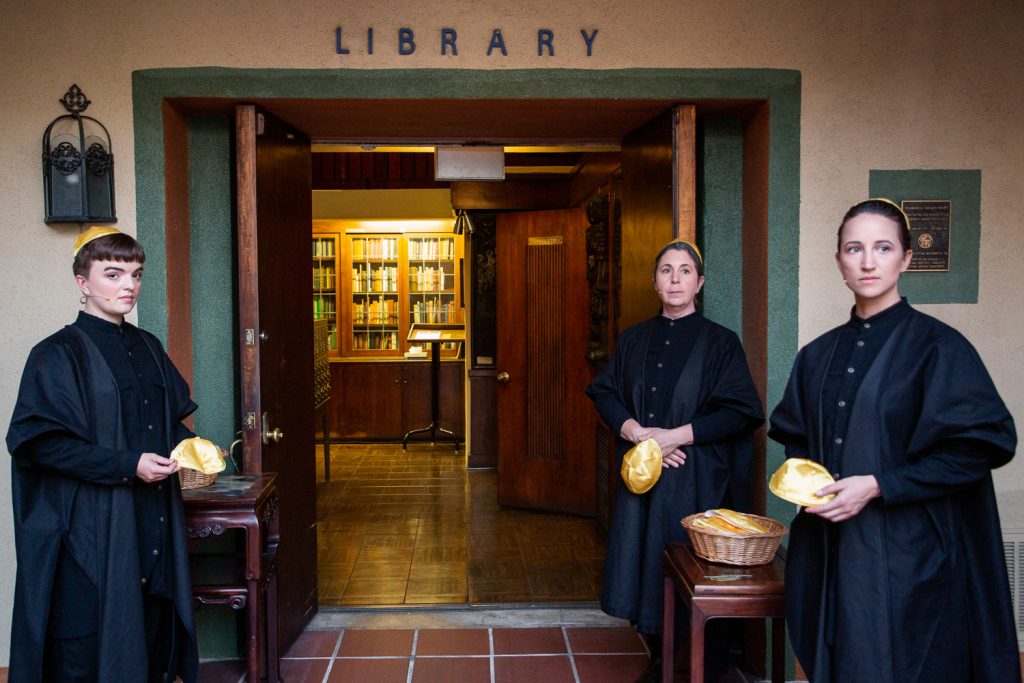
theatre dybbuk – “hell prepared” – Molly Pease, Rebecca Rasmussen, Monika Beal – Photo by Taso Papadakis
“We all actually meet roughly once a month.” Henne explained. “I am writing. I’m bringing in script pages, research. I’m bringing in thoughts about where the piece might be headed. We read those and we discuss.”
For the first five meetings, his script pages are primarily his thoughts on the subject and the meetings are about research. It is around the seventh meeting that Henne begins to bring in a script that he said resembles more of a draft. The theatre dybbuk ensemble continue to respond to his writings and to ask questions or make suggestions. As a result, the play is shaped by the entire ensemble becoming part of the creative conversation.
“While it’s singularly written, it is group developed. By around meeting number ten, we have what I would call a rehearsal draft.” He explained that if one read this draft she/he would be reading approximately seventy percent of what would later appear on stage. It was his next statement, however, that illustrated why theatre dybbuk’s work spoke so directly to the dancer/choreographer in me and made me feel that the movement in Henne’s work was a large part of what was telling the story.
“But, because the work is so multi-disciplinary, and half the language is happening physically, what is written on the page is illuminated in a totally different manner once we get into rehearsal” he said. Like many, if not all, choreographers, Henne is often inspired to make changes to his script by what the actors bring to it as they move physically. He explained that the movement is so informative that he will sometimes cut back on the language. Following those first ten meetings, the company moves into an intensive three-week development process where it may look and feel like rehearsals, but the script is constantly shifting or changing. It is only then that Henne directs the ensemble through a formal four-week rehearsal period, and in addition to this entire year(s) long process, he meets several times a month for what he calls physical development sessions with the actors, the choreographer and other production staff.
theatre dybbuk’s first piece was titled Cave….a dance for Lilith, in which Henne and the company collaborated with choreographer Kate Hutter Mason for Los Angeles Contemporary Dance Company (LACDC) in 2012. One of the dancers in that company was Andrew Person who has since left LACDC and earned a name for himself as a very talented choreographer, and to create Andrew Pearson’s bodies in play. Pearson is also the choreographer for breaking protocols.
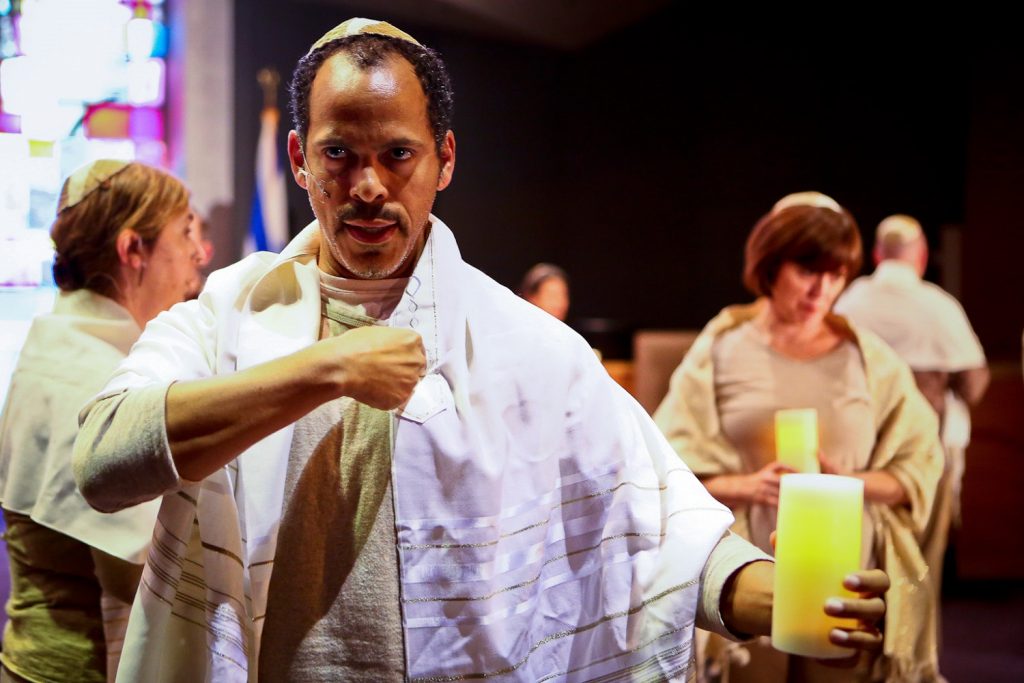
theatre dybbuk – “tefillah” – Joshua Wolf Coleman (background L – Rebecca Rasmussen, R – Shirley Anderson) – Photo by Taso Papadakis
“I’ve always admired Andrew’s work,” Henne said. “and felt that his work was a match for what we do.” Because of scheduling and observing Pearson’s work over a period of time, it became clear to Henne that this was the project to bring Pearson aboard as choreographer; we agreed that Pearson is a story teller. In order to better know the cast, and for them to know him and his movement style, Pearson led physical workshops with the actors. This process has, of course, been interrupted by the COVID-19 outbreak, so for the first time the cast and Pearson will work together webinar style. It gives an entirely new meaning to virtual conferencing.
Presenting the online In-Process Event on April 25th is a first for theatre dybbuk. If all goes as planned, the company will present a reading of selections from Henne’s script for breaking protocols performed by actors in their own homes a la Zoom webinar. The readings will be followed by a brief talk/discussion during which the ensemble will share some of the company’s creative processes and hopefully answer people’s questions.
“A lot of our work throughout the country is that we are brought in to do storytelling workshops” Henne said. So, near the end of the online In-Process Event, the company will ask the audience to think about their own stories of how the use of false narratives are connected to their own experiences in the world. “We’re then going to take them through a writing workshop where they get to write their own stories. We will even invite them to email them to us and the actors will then read them and we will post these readings online so that audience members can hear their own narratives performed by our ensemble. It will be a wonderful way for the audience to better connect with and understand the underlying questions raised by breaking protocols.”
Looking back on the history of the struggles that Jews and other “minority” groups down through the ages have raised numerous questions for Henne and others. The biggest question, of course, is why. Why are certain people, races or cultures looked down upon, marginalized, imprisoned, enslaved or shunned?
Around the globe, things are unsettled, in flux, and events have been cancelled or postponed. The future is unclear and we all should realize that things may never be the same. The situation for theatre dybbuk is no different and their August premiere of breaking protocols is in question due to the effects of COVID-19 upon our country and the world. Along with the question of will they have to postpone their August run, the group is pondering the questions raised within this play.
“I think that there is another level going forward for me as a writer grappling with these questions” Henne said. “We don’t want to lose sight, even as we are trying to figure out how to live in this new reality, that this is also a moment where people who are marginalized or seen as “the other” might be in even greater danger. This is a moment where we want to keep that awareness higher not lower.” Wise words of advice not just for this time, but for the days and years ahead.
The two hour In-Progress Event of theatre dybbuk’s new play breaking protocols takes place online at 8 PM on April 25, 2020. This online event is FREE. To reserve tickets, click here.
Due to the COVID-19 outbreak, the details of the company’s May 27th performance at The HIVE at Leichtag Commons in Encinitas are still being determined.
Written by Jeff Slayton for LA Dance Chronicle, April 15, 2020.
To visit the theatre dybbuk website, click here.
Featured image: theatre dybbuk in “exagoge” – (L > R) Rebecca Rasmussen, Jonathan C.K. Williams, Diana Tanaka, Rob Adler, Julie A. Lockhart (masked), Jenny Gillett, Nick Greene – Photo by Taso Papadakis

